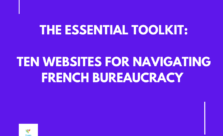Here I was, bright-eyed and excited to be in Paris.
In awe of this extraordinary city, I was soon drawn into the local culture.
Not a bad thing, since Paris was to be my new home.
But I still needed to find a home. And therein lay the problem. I’d spent so much time making sure my papers were correct and finding my way around town that I neglected to research fully what was needed to convince a landlord to take a chance on me as a tenant.
I assumed it would be easy to find a place and settle down. But I was so wrong. Here are some of the things I wish I’d learned beforehand.
- That rental leases for furnished and unfurnished apartments didn’t function under the same legal rules.
Sure, there is a difference between what constitutes furnished and unfurnished apartments in Paris. But what I learned wasn’t very consistent. I found that unfurnished rentals could mean four walls, a bathroom, a sink and some cabinets (perhaps); it may or may not include a refrigerator and stove, if you were lucky. Everything else was up to the tenant’s pocketbook. If an apartment was furnished and you broke something—a piece of furniture, for example—you’d likely have to pay for that damage, too.
I have since come to understand that a standard lease regarding unfurnished (vide) rentals is for at least three years, and for furnished properties (meublée), at least one year. To be considered meublée, the property must have a bed and linen; covering for the windows; stove, oven or microwave; refrigerator and freezer or something comparable; tableware; kitchen utensils; tables and chairs; storage shelves; lighting; and housekeeping equipment.
- That many apartments were already listed on Airbnb & other platforms and I could transition into those at a nice rate without spending much chasing for last-minute cheap hotel deals.
Online classified ads are your best friend. I could have saved money and huge amounts of time by using a platform like Airbnb. Sites like this make it easy to search through hundreds of options, narrow it down to what you need and where then book it with the click of a mouse. There are many others, too, that are just as helpful and may suit your needs: Roomarama, Wimdu, Rentalo, Flipkey, Homestay, Homeaway and 9flats are some of the best options out there.
- That some apartments are more expensive because their owners prefer renting them out to company personnel.
In my frantic, uneducated search for a place to rent when I first arrived in Paris, I came across all sorts of options that didn’t make sense to me, at first. And the prices didn’t seem to have any rhyme or reason. There were both long-term and short-term rentals that were hugely expensive and I didn’t understand why. Later, I figured out that some of these particular landlords were looking for a certain kind of lessee: the foreign worker employed by a French company for a specified period of time. It would be guaranteed, no risk income on the part of the landlord. Of course, I didn’t fall into that category, so I didn’t get very far when I looked into these options.
- That some arrondissements (administrative districts) are posher than others and where you live matters a lot depending on your commute time & if you’re interested in social status.
In Paris, there are twenty arrondissements to choose from. Naturally, they vary in size, location and what’s available in terms of affordable rent, transit, and so forth. It helped to know what arrondissement would work best for getting to work via the Metro, as well as being affordable to live in.
Take the 16th arrondissement, for example. It’s the furthest west district, has nineteenth-century buildings, prestigious schools, museums and parks. French high society calls it home, and it has been associated with great wealth in French popular culture. It’s the third richest district for average household income, and yes, high rents. Traveling into the city would take time, but if you can afford to live there, and social status is important to you, then it’s the place to be.
Compare this to the 2nd arrondissement—the smallest in Paris—and which has the densest concentration of commercial activity in the capital, located close to the heart of the city. People work and shop there, and yes, it’s convenient to transit, but living in that environment might not be for everyone, though rent might be lower.
- That I needed to be established in France first before looking for a place to rent.
Try as I might, I couldn’t get very far with finding a place to call home until I had my visa, carte de séjour, a job and bank account, at the very least. I didn’t have a guarantor to vouch for me financially, so I had to make sure all these things were in place first.
The owner of your future, fabulous rental won’t even consider you unless you have your application paperwork (dossier) in hand. Your prospective landlord wants to know you have a job or have the funds to pay on time, every time. He also wants to verify your identity and may ask for a guarantor if you’re a student or have limited personal funds. The guarantor, if needed, must live in France. It’s difficult to get a landlord to work with a guarantor outside of the country.
A dossier should contain the following documents:
- A photocopy of your ID (carte de séjour, passport, etc.)
- A photocopy of your job contract, if you’re employed
- Your last 3 payslips, if employed
- Last year’s tax filings (from France or your previous country)
- If they ask you for a guarantor, especially if you’re in your twenties, or a student, you will need the three most recent payslips of your guarantor
- Proof of address for your guarantor (a utility bill, for example)
- You might need the last three receipts of rent payment from your last landlord, whether or not that rental was in France.
- They may ask for your bank account info
- That searching for accommodation using a network of friends was “un petit plus.”
Many French residents find their apartments through friends or a “friend of a friend” who heard/saw something in real-time/online and recommended them. I found that becoming a part of an expat group helped immensely with finding a place to live. These are people who have lived here for a time and so would be intimately familiar with the process and its pitfalls. If you’re not already a part of an expat group, you should join one.
- That it is important to call upon a house-hunter/agence immobilière/agence de location immobilière if you can afford their services.
Never underestimate the power of having someone else do your house-hunting for you. It gives you more time to take care of the other fun things in life, like the best place to get your new favorite bottle of wine, and where to find free wi-fi. Agencies do everything for you, and all you have to do is give them certain specifics. They take care of the rest.
Sites like http://www.lodgis.com/en, http://www.parisrental.com, http://en.parisinfo.com/where-to-sleep-in-paris/appartment-furnished-rentals, can be very helpful.
- No one told me about these specialized websites:
www.adele.org
This is a website geared toward students looking for places to rent. The Association pour le développement du logement étudiant (adéle) is a fount of information from finding a place to rent to locating residence halls.
www.colocation.fr
For those who are looking for a flat-share, as well as a guide to Paris.
www.mapiaule.com
Classifieds for jobs and apartments, and a forum.
www.sergic.com
A useful search engine for apartments.
www.pap.fr and www.seloger.com are useful for private property transactions.
- No one organized any workshop where an expert could come to explain and discuss different tips on getting an apartment in Paris.
Nowadays, there are forums, meetups, videos and more that provide tips to the Paris newbie. It’s almost as simple as typing in a parameter et voilà, up pops a variety of sources. Back then, it was more word of mouth, crossing your fingers and hoping for the best. Facebook, Twitter and Myspace were picking up speed, but a social networking platform and forums with sources of information outside of hotel or travel sites were just starting to grow. Expat groups offer a lot of opportunities to find this sort of information
- That there were specific tips & unofficial rules/habits on how to behave when visiting an apartment
- Arrive early – you’re not the only one in Paris desperate for a place to live. However, that desperation shouldn’t be visible when you arrive. Give yourself enough time to check out your surroundings, location of grocery stores, transit, what the neighborhood is like. Be pleasant at all times with your prospective landlord, but don’t try too hard.
- Have all your documents ready – it makes a good impression and shows you’re serious about renting the place.
- Be brief – don’t say things that could be used against you. Don’t tell the landlord everything about yourself. Just say enough. Get to the point, while still maintaining a professional and friendly air.
- Be familiar with illegal clauses – do your research to make sure you understand what is or isn’t illegal before you meet with a prospective landlord. That way, at least you’ll spot someone suspicious or dishonest.
- Follow up – keep searching until you find something, but make sure you follow up with those landlords that you’ve already met with. You’re not the only one shopping around. Landlords are, too.
- That I shouldn’t sign a lease without getting these 7 key elements from a landlord:
It may seem self-explanatory, but in the euphoria of having landed your longed-for rental, you might forget a few things. Make sure your landlord gives you:
- The keys – yup, gotta be able to get into your apartment.
- Original copy of lease – proof of your contract with the landlord and likely necessary for setting up things like utilities, and so forth.
- Original copy of the walk-through état des lieux – this will help when you’re moving out and covers your butt if the landlord tries to say you damaged something you didn’t.
- Receipts for your rent and security deposit payments – you never know when you’ll need proof of payment in the future.
- CAF Attestation de Loyer – make sure the landlord fills this out so you can apply for assistance. Have the landlord sign this upfront so there are no problems later on.
- Copy of a recent utility bill in the landlord’s name – it can be used as proof of residence when you’re trying to set up your utilities.
- Landline number, electric and gas account numbers and consumption figures – most of this comes from the previous occupant’s information, and the landlord should be able to give you what you need so you can set these accounts up in your name.
- That I could apply for rental assistance in France via the CAF if I qualified for it.
La Caisse des Allocations Familiales, (CAF) is a form of rental assistance paid to anyone who qualifies. Sometimes called APL or Aide Personalisée à la Location, you may qualify if you meet these criteria:
- Live in an apartment that’s eligible for CAF
- Made very little money in previous years.
- Make very little money currently
- Are a student
- Live with other low-income students
- Have a valid carte de séjour or EU passport
- Have a French bank account
Do it as soon as possible after moving into your apartment. It can take several months to process, but they will backdate the check to the month you’re eligible. You can apply online through the CAF website.
- That regulations change almost every year depending on the new government, the city’s policies & more political-related stuff.
It boggled my mind the way the regulations regarding rentals changed so often. But in an effort to address the rampant overpricing of units and perhaps provide some stability, rent caps came into effect in Paris on August 1, 2015 and involved setting average rental prices per area. Landlords may set lease prices for new renters up to 20% over or 30% under median rates. It continues to be a controversial ruling, but preliminary results seem to show the percentage of landlords exceeding the maximum rates have declined from 46% to 29%.
All in all, I am happy where I am now, but it would have been nice to have avoided all the headaches had I had this information at my fingertips.



